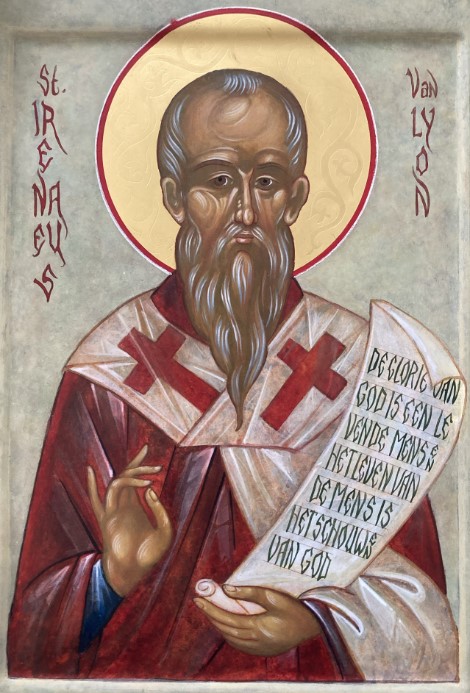Do you want to support our activities for a longer period of time? Plan a monthly or annually recurring bank transaction to NL40 INGB 0007 7871 39 in name of Stichting St Irenaeus Orthodox Theologisch Instituut.
Knowing that we can count on your support makes it possible for us to take concrete steps to realize planned projects.
If you commit to supporting us financially for a period of at least five years, you can get additional tax benefits. By recording your donation in a written agreement, you can deduct it in full when you file your income taxes.
Is this interesting for you? Contact us via office@irenaeus.nl.
Each donation helps us to work towards the realization of our objectives.
You can make a donation by bank transfer to NL40 INGB 0007 7871 39 in name of Stichting St Irenaeus Orthodox Theologisch Instituut.
The most important tasks of the St Irenaeus Institute are academic education and research, for which we receive governmental funding. In addition to this, we see it as part of our mission to spread Orthodox theology, both for the growing Orthodox community in the Netherlands and for a wider audience. We are working on various projects to support this mission, and have more projects that we would like to be able to undertake. One example is a translation of the Psalms into Dutch, which we have recently finished and hope to follow up with related publications. We are only able to undertake these projects with your support. You can find descriptions of the various projects at the bottom of this page.
Donations to St Irenaeus are deductible from income taxes in the Netherlands. See this page for more information.
Praying with the Early Church (Bidden met de Vroege Kerk) is a sequel in the style of De Psalmen van de Vroege Kerk.
In this edition we want to combine the Odes with a selection of prayers from the liturgy of hours, from both the Eastern Orthodox and the various Oriental Orthodox traditions.
The Bible Book of Odes (also called the Biblical Odes) in the Septuagint is mainly composed of poetry from the Old and New Testament. In the Greek manuscripts the Odes were usually transmitted together with the Psalms. Canticles such as the Magnificat (“My soul magnifies the Lord”) and Nunc Dimittis (“Now you let depart, Lord, your servant”) fulfill an important role as liturgical texts in both East and West.
Together with De Psalmen van de Vroege Kerk it is possible to pray in the daily rhythm of the Early Chruch and experience her wealth and diversity.
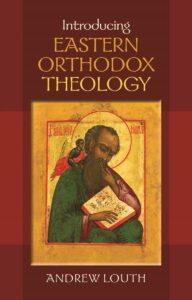 Many important patristic and theological texts are not yet available in an accessible, Dutch-language edition. St Irenaeus Institute wants to meet the demand of mostly young people with an interest in the Orthodox church by translating and publishing these texts. For this purpose, we want to set up St Irenaeus Press
Many important patristic and theological texts are not yet available in an accessible, Dutch-language edition. St Irenaeus Institute wants to meet the demand of mostly young people with an interest in the Orthodox church by translating and publishing these texts. For this purpose, we want to set up St Irenaeus Press
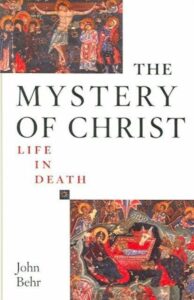
Some currently planned publications are Dutch translations of books written by Father Andrew Louth and Father John Behr, and translations from the Greek original of patristic texts by authors such as Evagrius Ponticus and Maximos the Confessor.
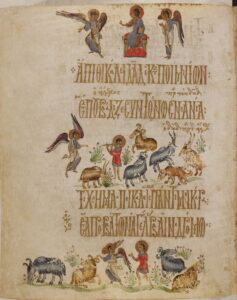 One of our wishes is to publish a fully illustrated edition of the Psalms, building on the publication of De Psalmen van de Vroege Kerk. It is common in the medieval manuscripts to have illustrations in the margins around or in between the text (see the image to the right for an example from the Theodore Psalter (British Library Add. Ms 19352)). These illustrations often give a hint as to how the text was read in that time. They often make the christological and psychological interpretations of the Psalms explicit. For example, Psalm 2 is often accompanied by an illustration of the birth of Jesus Christ (“The Lord said to Me: “You are my Son; today I have begotten You.”).
One of our wishes is to publish a fully illustrated edition of the Psalms, building on the publication of De Psalmen van de Vroege Kerk. It is common in the medieval manuscripts to have illustrations in the margins around or in between the text (see the image to the right for an example from the Theodore Psalter (British Library Add. Ms 19352)). These illustrations often give a hint as to how the text was read in that time. They often make the christological and psychological interpretations of the Psalms explicit. For example, Psalm 2 is often accompanied by an illustration of the birth of Jesus Christ (“The Lord said to Me: “You are my Son; today I have begotten You.”).
We want to base this illustrated Psalter edition on an existing restoration of the illustrations in the Theodore Psalter and the text of De Psalmen van de Vroege Kerk. Since the existing edition is in Church Slavonic, it will take a lot of meticulous work to adapt all the captions and ensure that all the illustrations are connected to the right text.
This edition is only possible with your financial support.
A natural follow-up to a translation of the Psalms is the New Testament books in which they are frequently quoted. It’s practical to focus in the first place on the pericopes that are read during Orthodox church services, especially on Sundays and Feast days. A good basis to build on is the Nieuwe Bijbelvertaling 2021 (NBV21). We will make a limited amount of changes in this text: for the Psalm quotations our own translation is used, the Greek source text used is the Byzantine text, and we retain certain tehological concepts that are also used in patristic and liturgical texts.
The aim is to produce a set of practical liturgical books.
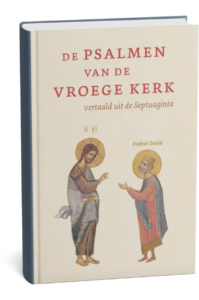 De Psalmen van de Vroege Kerk (“The Psalms of the Early Church”) is a Dutch translation of the Psalms with the Septuaginta text as its basis. This Greek translation of the Old Testament was made in Alexandria, well before the birth of Jesus Christ. It has been the authoritative text of the Old Testament for most Orthodox churches since the time of the Early Church. This translation reveals the poetry of the Psalms in contemporary Dutch, while retaining key words from the Christian tradition, such as ‘zalig’ (blessed), ‘genade’ (grace) en ‘barmhartig’ (merciful).
De Psalmen van de Vroege Kerk (“The Psalms of the Early Church”) is a Dutch translation of the Psalms with the Septuaginta text as its basis. This Greek translation of the Old Testament was made in Alexandria, well before the birth of Jesus Christ. It has been the authoritative text of the Old Testament for most Orthodox churches since the time of the Early Church. This translation reveals the poetry of the Psalms in contemporary Dutch, while retaining key words from the Christian tradition, such as ‘zalig’ (blessed), ‘genade’ (grace) en ‘barmhartig’ (merciful).
De Psalmen van de Vroege Kerk offers everyone the opportunity to become acquainted with the traditions of the Early Church. The icon on the cover provides the key to the ‘christological’ way that the early Christians read the Old Testament: the poet David, to whom the book of Psalms is typically ascribed, tells of Christ, who is before him and who will come after him. The ‘psychological’ interpretation of the desert fathers and mothers is touched upon in the introduction: the enemies the Psalms mention become the spiritual demons one struggles with. The appendices offer an insight into the liturgical use of the Psalms in the Hours in East and West and into the use of the Psalms in personal prayer.
This edition was produced in cooperation with the Bible Society for the Netherlands and Flanders (Nederlands-Vlaams Bijbelgenootschap).
An account of the presentation can be found here.

